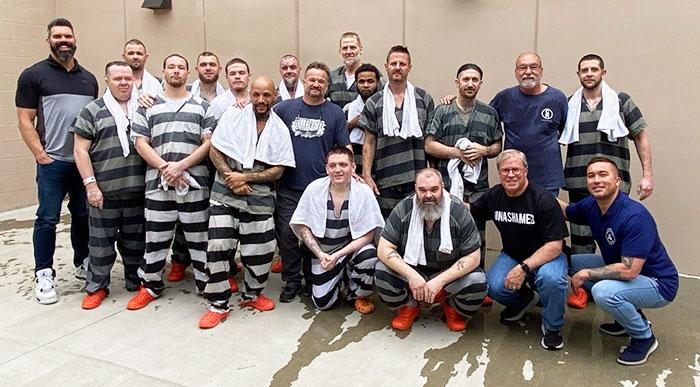In a remarkable display of resilience and determination, 58 inmates at the Kano State Correctional Centre have taken a significant step towards enhancing their educational qualifications by participating in the 2025 National Examination Council (NECO) Senior School Certificate Examination (SSCE). This unprecedented initiative underscores the ongoing efforts to provide transformative educational opportunities within correctional facilities, aimed at fostering rehabilitation and reintegration into society. As these inmates prepare to undertake the rigorous examination, their stories illuminate the challenges and triumphs faced by those striving for a better future, even behind bars. This article delves into the motivations behind their pursuit of education and the broader implications for Nigeria’s correctional system and societal reintegration efforts.
Inmates Participate in NECO SSCE Exam: A Step Towards Reintegration
In a groundbreaking initiative, 58 inmates in Kano have taken a significant step towards their reintegration into society by participating in the 2025 NECO SSCE examination. This collaborative effort between the correctional facilities and the National Examinations Council is aimed at equipping inmates with essential educational qualifications, fostering hope, and enhancing their prospects for a successful future upon release. By participating in the examination, these individuals not only demonstrate their commitment to personal development but also challenge the stigma often associated with incarceration.
The NECO SSCE exam provides an invaluable opportunity for inmates to gain qualifications that may improve their employability and reintegration prospects. The initiative includes a comprehensive support system, ensuring that participants have access to study materials, tutoring, and a conducive learning environment. Key benefits of this program include:
- Empowerment through education
- Reduction of recidivism rates
- Improved self-esteem and social skills
This innovative educational approach highlights the importance of second chances and aims to pave the way for a more rehabilitative justice system, ultimately benefiting both the inmates and the community.
Impact of Education on Inmate Rehabilitation: Insights from the Kano Experience
The recent participation of 58 inmates in the 2025 NECO Senior School Certificate Examination (SSCE) in Kano marks a significant step towards integrating education into rehabilitation efforts. This initiative highlights the transformative potential of education within correctional facilities. By providing inmates with access to academic programs, authorities are fostering an environment where individuals can develop skills that enhance their prospects for reintegration into society upon release. This approach aligns with several research findings emphasizing that education during incarceration can lead to reduced recidivism rates and improved societal adaptation.
Key benefits observed from educational programs in correctional settings include the following:
- Skill Development: Inmates acquire essential skills that increase employability.
- Personal Growth: Education encourages critical thinking and self-reflection, fostering a more adaptable mindset.
- Stronger Community Ties: Educated individuals are more likely to engage positively with their communities post-release.
As the Kano experience demonstrates, investing in inmate education not only benefits the individuals directly involved but also contributes to a safer and more informed society as a whole. The ripple effect of providing access to quality education within correctional institutions can be profound, ultimately leading to sustainable change in crime rates and community health.
Recommendations for Enhancing Educational Opportunities in Correctional Facilities
To maximize the educational potential within correctional facilities, implementing a multifaceted approach is essential. Collaboration with educational institutions can provide qualified instructors and a structured curriculum tailored to the unique circumstances of inmates. Engaging local universities or organizations to offer volunteer teaching programs not only enriches the learning experience but also fosters a sense of community involvement. Additionally, integrating vocational training alongside traditional academics can prepare inmates for meaningful employment upon release, reducing recidivism rates and promoting societal reintegration.
Moreover, investing in technological resources is critical for modernizing education in these settings. Providing access to computers and online learning platforms can expand course offerings and facilitate self-directed learning. Additionally, developing mentorship programs connecting inmates with successful professionals can inspire ambition and provide important life skills. A supportive environment that encourages educational achievement will create a foundation for hope and rehabilitation, ultimately benefiting both inmates and society as a whole.
Closing Remarks
In conclusion, the participation of 58 inmates in the 2025 NECO SSCE in Kano marks a significant step towards rehabilitation and reintegration within the Nigerian education system. This initiative not only provides inmates with hope for a better future but also highlights the importance of education as a transformative tool, even in the most challenging circumstances. As the candidates prepare to take their exams, their determination serves as an inspiring reminder of the potential for change and growth. The efforts of educational authorities and prison officials in facilitating this process reflect a commitment to inclusivity and the belief that education should be accessible to all, regardless of their circumstances. With the results of the NECO SSCE to be announced in the coming months, the success of these inmates will undoubtedly resonate beyond the prison walls, potentially paving the way for similar initiatives across the nation.
